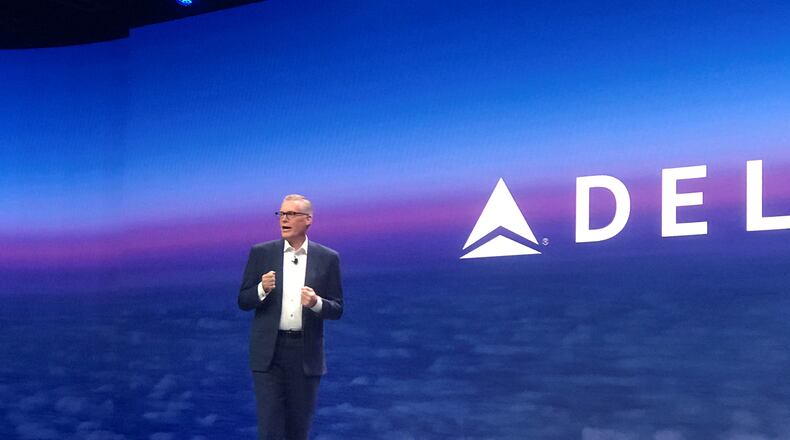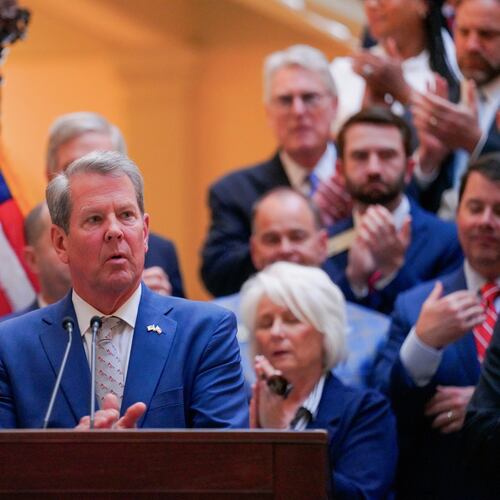Delta Air Lines CEO Ed Bastian wants to transform the air travel experience by the year 2025.
He envisions that when you request a ride to the airport, Delta’s app could recommend how early you need to leave based on highway traffic, and which airport security checkpoint has the shortest lines.
Your bags would be picked up from your home and delivered to your hotel, so you wouldn’t need to lug suitcases to the airport or wait at baggage claim.
You could choose which seats to book during a virtual walk through the plane via augmented reality and you could track your bags through the Fly Delta app as well as pets and a child traveling alone.
“If the stress of traveling starts even before you leave home, how can we alleviate it?” Bastian said Tuesday during a keynote speech at the world’s largest consumer technology show.
Delta has invested “billions” over the past five years to transform the Atlanta airline’s technology, Bastian said at CES, which is held in Las Vegas every year and attracts more than 175,000 people.
Bastian is the first airline CEO to deliver a keynote address at CES, formerly known as the Consumer Electronics Show.
A big part of Delta's plan is linking to other parts of the travel experience including your ride to the airport and personalizing customer service based on your past travel history on the airline.
The airline announced plans at the conference to expand its partnership with ride-share company Lyft, such as incorporating flight delays, weather and traffic when passengers request a ride to the airport. The two companies also are exploring features like allowing travelers to pay for rides with miles.
Another project: Personalized information displays for travelers at the airport, to be piloted at Delta’s Detroit hub this summer. The technology, called parallel reality, can display different customized information to multiple people simultaneously on the same screen — allowing travelers who opt in to get information displayed on their particular gate and flight status in their preferred language.
Bastian said Delta has also partnered with startups to transport pets and to sanitize surfaces with antimicrobial lights.
Airlines have long had a more industrial and operational focus on the nuts and bolts of transportation, and Delta has fumbled on technology in the past, including system failures that grounded flights for hours in Bastian's first year as CEO. The company invested in backup systems to avoid such outages in the future.
When Bastian took the helm of Delta in 2016, he emphasized that the airline needed to keep its image "fresh" to "appeal to the needs of a new generation." Bastian said at the time that he wanted to keep Delta's brand and technology fresh in part because half of its employees would soon be millennials.
Delta’s debut as a major presence at CES is a step toward that goal, and a bid to become known as an airline leading the way on innovation.
Some technological advances are slow-going. Bastian more than a year ago said he wanted to make in-flight wi-fi free, but that hasn’t yet happened, and Bastian said he expects it to become a reality in “the next couple of years.”
At a massive exhibit booth, though, Delta executives are delivering talks this week on how the airline is using artificial intelligence to prepare for mass disruptions like storms, partnering with high-tech startups and launching its own venture to manufacture in-flight entertainment systems and other products.
The company is also demonstrating a battery-powered exoskeleton, or robotic suit, that could give cargo or maintenance workers superhuman strength to handle freight, machinery or heavy equipment.
The airline said its app this month will begin notifying customers when their seat is boarding.
Karen Chupka, executive vice president of CES, said among the technology on display at the show are innovations that transform the travel experience.
“From IoT (Internet of things) innovation to biometric security, you’re never going to travel the same way again,” Chupka said.
About the Author
Keep Reading
The Latest
Featured







